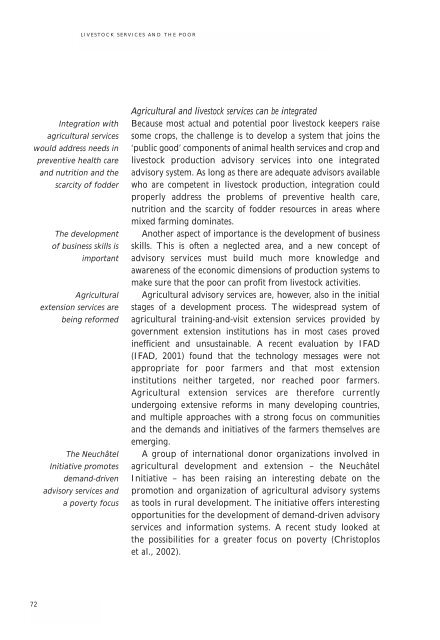Livestock Services and the Poor: A global initiative - IFAD
Livestock Services and the Poor: A global initiative - IFAD
Livestock Services and the Poor: A global initiative - IFAD
You also want an ePaper? Increase the reach of your titles
YUMPU automatically turns print PDFs into web optimized ePapers that Google loves.
Integration with<br />
agricultural services<br />
would address needs in<br />
preventive health care<br />
<strong>and</strong> nutrition <strong>and</strong> <strong>the</strong><br />
scarcity of fodder<br />
72<br />
LIVESTOCK SERVICES AND THE POOR<br />
The development<br />
of business skills is<br />
important<br />
Agricultural<br />
extension services are<br />
being reformed<br />
The Neuchâtel<br />
Initiative promotes<br />
dem<strong>and</strong>-driven<br />
advisory services <strong>and</strong><br />
a poverty focus<br />
Agricultural <strong>and</strong> livestock services can be integrated<br />
Because most actual <strong>and</strong> potential poor livestock keepers raise<br />
some crops, <strong>the</strong> challenge is to develop a system that joins <strong>the</strong><br />
‘public good’ components of animal health services <strong>and</strong> crop <strong>and</strong><br />
livestock production advisory services into one integrated<br />
advisory system. As long as <strong>the</strong>re are adequate advisors available<br />
who are competent in livestock production, integration could<br />
properly address <strong>the</strong> problems of preventive health care,<br />
nutrition <strong>and</strong> <strong>the</strong> scarcity of fodder resources in areas where<br />
mixed farming dominates.<br />
Ano<strong>the</strong>r aspect of importance is <strong>the</strong> development of business<br />
skills. This is often a neglected area, <strong>and</strong> a new concept of<br />
advisory services must build much more knowledge <strong>and</strong><br />
awareness of <strong>the</strong> economic dimensions of production systems to<br />
make sure that <strong>the</strong> poor can profit from livestock activities.<br />
Agricultural advisory services are, however, also in <strong>the</strong> initial<br />
stages of a development process. The widespread system of<br />
agricultural training-<strong>and</strong>-visit extension services provided by<br />
government extension institutions has in most cases proved<br />
inefficient <strong>and</strong> unsustainable. A recent evaluation by <strong>IFAD</strong><br />
(<strong>IFAD</strong>, 2001) found that <strong>the</strong> technology messages were not<br />
appropriate for poor farmers <strong>and</strong> that most extension<br />
institutions nei<strong>the</strong>r targeted, nor reached poor farmers.<br />
Agricultural extension services are <strong>the</strong>refore currently<br />
undergoing extensive reforms in many developing countries,<br />
<strong>and</strong> multiple approaches with a strong focus on communities<br />
<strong>and</strong> <strong>the</strong> dem<strong>and</strong>s <strong>and</strong> <strong>initiative</strong>s of <strong>the</strong> farmers <strong>the</strong>mselves are<br />
emerging.<br />
A group of international donor organizations involved in<br />
agricultural development <strong>and</strong> extension – <strong>the</strong> Neuchâtel<br />
Initiative – has been raising an interesting debate on <strong>the</strong><br />
promotion <strong>and</strong> organization of agricultural advisory systems<br />
as tools in rural development. The <strong>initiative</strong> offers interesting<br />
opportunities for <strong>the</strong> development of dem<strong>and</strong>-driven advisory<br />
services <strong>and</strong> information systems. A recent study looked at<br />
<strong>the</strong> possibilities for a greater focus on poverty (Christoplos<br />
et al., 2002).

















